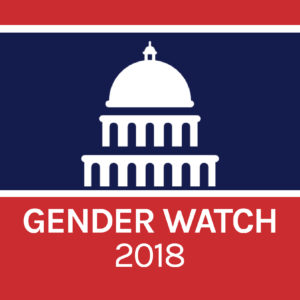One of the questions reporters have been asking me lately is: are voters more likely to support women candidates this election cycle? It’s a relevant and important question considering there are a record number of women candidates running in 2018. My answer is: it depends.
According to the Center for American Women and Politics (CAWP), roughly three-fourths of female candidates this year are running as Democrats. This surge of Democratic women candidates is likely due to several factors, including a strong reaction to the 2016 presidential election. But these women’s candidacies also reflect the values of their party’s voters. While the majority of women (54%) in a CBS poll conducted earlier this year said it is “very important” to elect women candidates, Democratic and Republican women were sharply divided on this question.
Among Democratic women, 77% say it is very important to them personally to elect women candidates, but just 19% of Republican women voters place the same priority on electing women. Similarly, 84% of Democratic women say that more women in political office would make the country better, compared with 19% of Republican women. Overall, 38% of men say the country would be better with more women in political office.
These findings are consistent with a poll conducted several years ago that found Democrats, particularly Democratic women, placed a high value on electing more women to Congress, while Republicans did not: 23% of Republicans (no difference between GOP men and women) agreed that “it would be a good thing if more women were elected to Congress,” compared with 60% of Democrats (69% of Democratic women and 54% of Democratic men). Academic research from 2009 and 2003 backs up these results, finding that support for more equitable representation in government is greater among Democrats and women.
I remember thinking during the 2016 campaign that discussion of Hillary Clinton breaking the glass ceiling – especially when she was talking about it herself – was, whether intended or not, primarily a signal to Democratic women voters. Similarly, when former Secretary of State Madeleine Albright told a crowd, “There’s a special place in hell for women who don’t help each other,” she was speaking directly to the Democratic women in the audience.
In 2018, it is important for women candidates to focus not just on who they are – gender or biography – but on what they have accomplished. This was a key finding in research we helped conduct for the Barbara Lee Family Foundation. We found that saying you were a “business leader who created jobs” was twice as powerful for women as saying you were “a small business owner.” Rather than saying you are a biologist, talk about how you are particularly focused on clean water, including the safety of the community’s drinking water, and plan to create a task force to examine it.
And while Republican and Democratic women differ in terms of the value they place on electing women candidates, there are inherent experiences and priorities shared by women across the aisle into which a woman candidate can tap. In an extensive national poll of women we conducted with Margie Omero for Business Forward, we found there was virtually no difference by party in women’s strong support for the following:
- Requiring men and women be paid the same wage or salary for the same job. (88% of women support)
Women in the poll said that “being paid less than a man for the same job” is the top obstacle they face, coupled with a lack of work flexibility and balancing work-family demands. These workplace obstacles have real economic consequences: 61% of women said they are “just getting by” and 13% are “falling behind.” Just one-in-four say they are getting ahead.
- Making it easier for women to safely report sexual harassment in the workplace. (87% of women support)
While just one-third of women in our national survey said sexual harassment in the workplace was an obstacle for them – far less than equal pay and work/life demands – there is widespread recognition that it exists and that we have yet to fully address it. There are partisan differences on some specific policies like requiring workplace training or fining companies who don’t have a strong sexual harassment policy, but all women agree it needs to be made easier to report abuse.
- Maintaining affordable health care coverage options for people who need it, regardless of pre-existing conditions, income, or job status. (86% of women support)
Health care remains a top concern for voters: in a post-election survey conducted among those who voted in the special election in Pennsylvania’s 18th Congressional District, health care was rated as the top issue informing their votes. It was also a top issue in Virginia’s 2017 gubernatorial election. Generally, health care is an issue that women candidates are more trusted to handle. Democratic women candidates have a significant advantage on this issue and Republican women’s ability to overcome the steep disadvantage that Republican men face with voters health care demonstrate that it’s an issue on which women candidates of both parties can stand out from their peers.
While the national media will continue to focus on the narrative of 2018 as the year of women candidates and what that may mean for Congress or the country, individual women candidates would do well to keep their campaigns focused on the issues and priorities of their constituents – women and men alike – rather than on their potential to make history.


 From March to December 2018, the
From March to December 2018, the